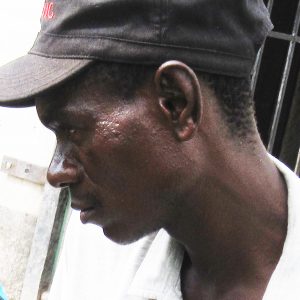Introduction
Alois Mutinhiri is currently the leader of the mbira group Mhuri yekwaMutinhiri in the Rwizi area of Mhondoro – an rural area renowned for its many excellent mbira players. He teaches many children in the area to play mbira and sing.
Recordings Available From MBIRA
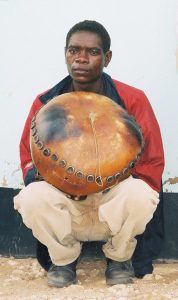
Use the links and listen to samples of Mutinhiri’s albums.
- 3666 Mhuri yekwaMutinhiri 2022 (scheduled for 2023 release)
- 3424 Mhondoro Mbira Group 2003
- 3406 Alois Mutinhiri Solo 2002 – Nyamaropa tuning Mbira & Vocals
- 3333 Mhondoro Mbira Group 2001
Video
Biography
(written by Denver Banda, based on a 2004 interview, edited by Erica Azim)
Early Life
Alois Murungweni Mutinhiri is an only child born 18 July 1970 to the Mbizi-Samaita clan in the Chegutu-Murungweni area. His special name, “Murungweni”, is that of his grandfather, a great hunter who played mbira at the sacred banya (house for ceremonies) at Nyandoro in Mhondoro Communal Area. Alois is the medium for Murungweni’s spirit.
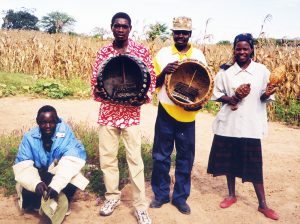
Learning Mbira
Alois began to play the mbira at the age of 8. Alexio, his cousin, had an instrument, and Alois played the bass keys for Taireva on it every time he got the chance. He often learned from his dreams – a not uncommon way spirits teach mbira to living mbira players. Alexio was surprised to hear Alois playing mbira of such complexity at his age.
When Alois was in the sixth grade, he played at his first bira ceremony at dusk, and the spirits came! Then, at 4 am, he played again. The reason he played so early in the night, and so early in the morning, was that he was so young, and needed his sleep! Also, his youth barred him from some of the privileges of older mbira players. After this ceremony, Alois’s father urged him to play mbira, although previously he had felt it conflicted with attention to schoolwork.
Alois’s uncle, Solomon Mutinhiri, made an mbira for Alois, who paid for it by ploughing his uncle’s fields during his free time.
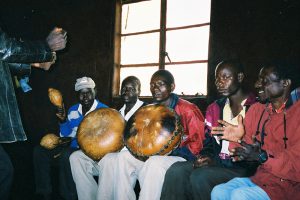
His grandfather’s spirit
A turning point in Alois’s life came when he was invited to play with his brother at Zirombe, where Alois was possessed by his grandfather’s spirit for the first time. The spirit asked his parents to prepare him for mediumship, including buying him cloth for his spirit. Alois was now given his grandfather’s old mbira to use.
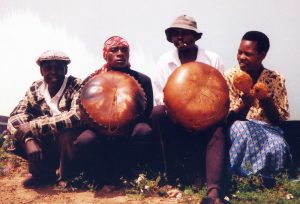
After this, Alois played intensively in Mutinhiri Village, including some solo playing at biras when other mbira players could not keep up with him. In high school, he was so shy about playing mbira that he played in the garden… but he was soon joined by various students and teachers, and his fame grew. He was eager to teach anyone who was willing to learn from him. Alois says, “Anyone who wants can learn from me for free because I cannot gauge the amount in monetary terms, since I did not pay the forces that gave me the talents.”
Trying city life

In 1994, Mutinhiri moved to Zimbabwe’s capitol city, Harare, and tried working as a barber without success. He became very sick, and beer was brewed for his ancestors, to ask them to make him well. Alois’s parents searched for him through announcements on the national radio station, whereupon Alois left his job and returned to Mhondoro Communal Area. Back in Mhondoro, he realized what he needed to do with his life – play mbira seriously, and grow crops for his family.
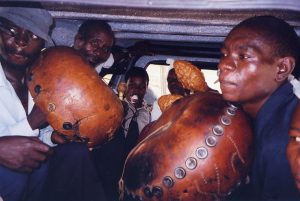
Going deeper with mbira
At the ceremonies that followed his return home, Alois played more songs at every performance. Over the years, Mutinhiri played for rainmaking ceremonies in the area. His favorite ceremony memory is summoning the ancestors through mbira music in 2003, resulting in so much rain that the drought-stricken, parched land became waterlogged.
Alois Mutinhiri follows simple mbira laws of giving praise to the ancestors before he embarks on a journey to perform. He does this because he says that mbira is a serious profession that sustains him and his family in harmony with the ancestors. “Murungweni” loves to sing the huro and kudeketera parts – lead mbira singing that includes both poetic lyrics and yodeling.
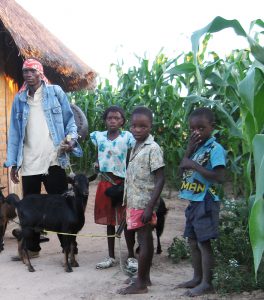
Mutinhiri uses two different pitches of nyamaropa tuning, higher and lower, depending on the season. However, low-pitched mbira tunings are his personal favorite.
When Mutinhiri sings, he sings to his ancestors of the troubles that befall him, so that they might offer divine intervention. His favorite mbira piece is Nyamaropa, because it is the song that brings the most holy of his ancestors.
Mhondoro Mbira Group
Mutinhiri is the leader of the Mhondoro Mbira Group. Their emphasis is on traditional songs. Alois wishes they could record in Zimbabwe so that a Zimbabwean audience could hear their music, but the local Zimbabwean recording industry no longer records traditional mbira. However, recording with MBIRA has changed the lives of Mutinhiri and his family.
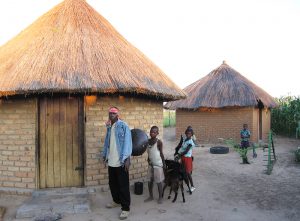
Spending royalties wisely
Erica Azim says, “I have always been very impressed that Mutinhiri arrives to be paid for recordings together with his wife, and immediately gives the money to her after receiving it. Each year I would hear what they had spent the money on: building a house, buying livestock, buying farming equipment, etc. All this in addition to the basics of food, clothing and school fees. When I met Mutinhiri, he and his wife lived with his parents because they couldn’t afford to build a place of their own. Now they are flourishing, through using the proceeds of his mbira recordings wisely.”
Modern Zimbabwe
To those in modern Zimbabwe who look down upon mbira, Mutinhiri says, “They need to be educated, they don’t know the reasons for the music. Those who don’t know suffer in their ignorance, but it can be resolved if they just accept the truth about their cultural history. They might have success with money, but its nothing without a culture.”
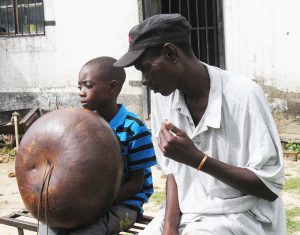
The next generation
Mutinhiri is married and has children who are keen to follow in their father’s large mbira footsteps.
